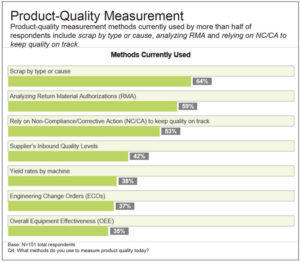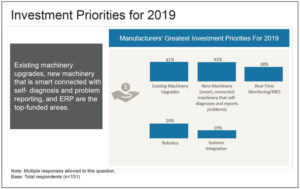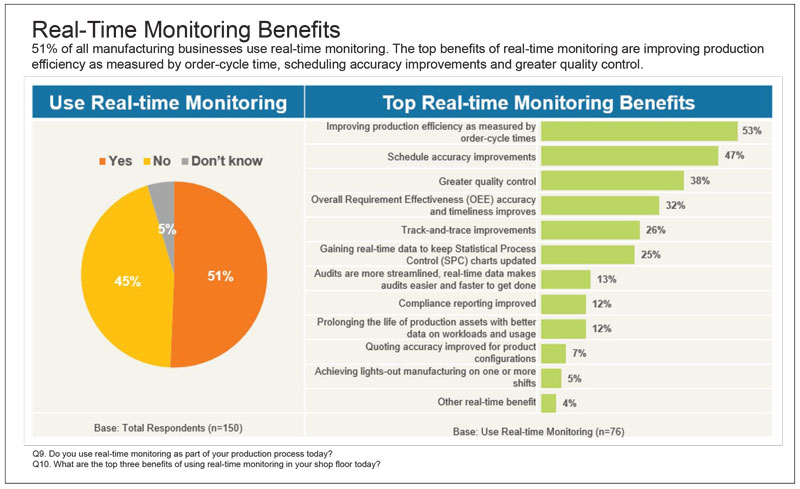by Louis Columbus, principal
IQMS
 The fastest-growing plastics processors and manufacturers excel at combining efficiency and production-based key performance indicators (KPIs) to gain in-depth insights and capitalize on them more quickly than their competitors. Central to these companies growing 10% a year or faster is their ability to combine analytics, business intelligence (BI), real-time monitoring and mobile-based applications that provide dashboards anytime, anywhere.
The fastest-growing plastics processors and manufacturers excel at combining efficiency and production-based key performance indicators (KPIs) to gain in-depth insights and capitalize on them more quickly than their competitors. Central to these companies growing 10% a year or faster is their ability to combine analytics, business intelligence (BI), real-time monitoring and mobile-based applications that provide dashboards anytime, anywhere.
These and other insights are from a recent Decision Analyst survey, Where ERP Is Making the Greatest Contributions To Growth, which was completed in coordination with IQMS, a division of Dassault Systèmes.
The primary goal of the research was to determine what most differentiates the fastest-growing manufacturers, as well as understanding their plans for 2019. In conducting the study, Decision Analyst surveyed 151 North American manufacturers, a majority of which produced plastics.
The surveys were complemented by site visits to plastic processors and manufacturers with the greatest increases in revenues, customers and operations. From conversations with these firms’ production teams, it was evident how data driven decision-making dominates the fastest-growing plastics businesses today – from maintaining a daily focus on measuring their impact on goals to the real-time dashboards production and senior management teams review on their tablets.
This article examines the four most prominent ways that highper forming plastics providers are combining KPIs to accelerate their growth.
Measuring quality via efficiency and production-based KPIs
A key differentiator among the fastest-growing manufacturers interviewed is their focus on using KPIs to measure the impact of their decisions on improving product and process quality. Notably, the 27% of survey respondents that are growing 10% a year or more report that they use efficiency-based metrics and KPIs as a baseline of their production operations. These manufacturers excel at finding how efficiency and production-based KPIs influence each other, understanding causality and predicting how product quality will impact related revenue and product outcomes.
High-performing plastics providers are more likely to track yield rates by machine, with 72% of this group using this metric versus 38% of all respondents. They’re also more likely to measure original equipment effectiveness (OEE) compared to the total base of respondents (42% of fast-growing manufacturers versus 35% of all survey respondents).
Finding the connection between efficiency and production-based KPIs begins in the Quality and Compliance departments of these high-growth manufacturers, where real-time insights are linked into their software for supplier quality management (SQM), quality control, quality management and compliance.
Real-time monitoring for immediate insights
Plastics processors and manufacturers have the highest real-time monitoring adoption rate at 74%, driven by their need to reduce scrap, increase yields and meet delivery dates. Meanwhile, in identifying the top three real-time monitoring benefits, 53% of all manufacturers cite improved production efficiency as measured by order cycle times, 47% note better scheduling accuracy and 38% list greater quality control.
Defining investment priorities
 The fastest-growing manufacturers also use a combination of efficiency- and production-based KPIs to define the best investment priorities for 2019. Among plastics processors and manufacturers, the highest investment priorities today are centered around improving performance through either existing machinery upgrades (41%) or new smart machines that are connected and capable of self-diagnosing and reporting problems.
The fastest-growing manufacturers also use a combination of efficiency- and production-based KPIs to define the best investment priorities for 2019. Among plastics processors and manufacturers, the highest investment priorities today are centered around improving performance through either existing machinery upgrades (41%) or new smart machines that are connected and capable of self-diagnosing and reporting problems.
Following close on the heels of these priorities is investing in the ability to gain greater visibility across manufacturing through real-time monitoring and manufacturing execution system (MES) software (38%). Additional investment priorities include robotics (29%) and system integration (19%).
Conclusion
By combining efficiency- and production-based KPIs, the fastest growing plastics processors and manufacturers are able to find insights and act on them faster than their competitors. They are more focused on how to turn their organizations into data-driven businesses. And, they often have real-time dashboards available via internal sites and, in some cases, mobile applications built within the company. For fast-growing plastics processors and manufacturers, overarching all of these strategies is a focus on becoming learning ecosystems that quickly aggregate, analyze and take action on new insights.
Louis Columbus serves as a principal at IQMS, part of the Dassault Systèmes portfolio. In addition to professional responsibilities, Columbus teaches MBA courses in international business, global competitive strategies, international market research and capstone courses in strategic planning and market research.
More information: www.iqms.com




